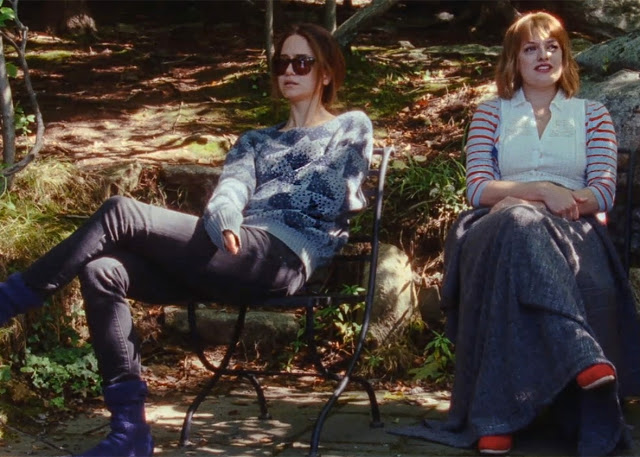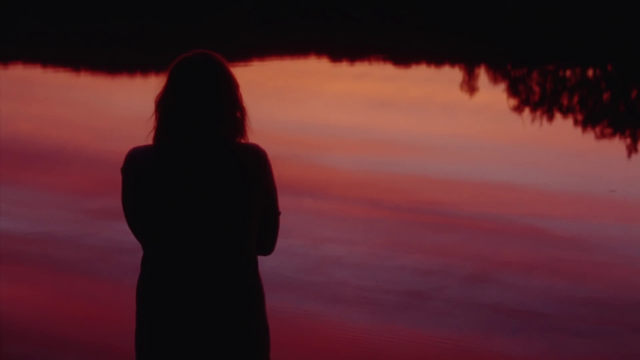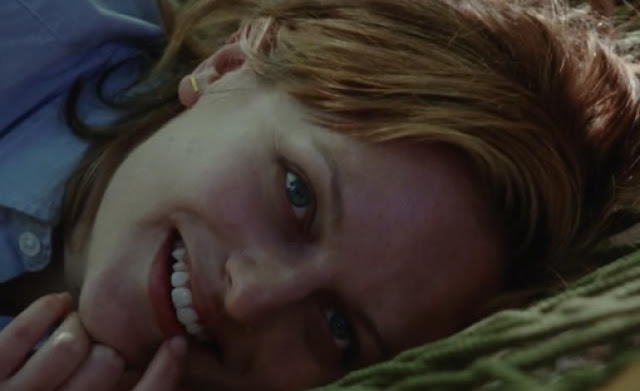Queen of Earth, the fourth feature from writer-director Alex Ross Perry, is a razor blade wrapped in translucent silk. It takes place almost entirely in a single, idyllic location—a sun-dappled New York lake house—where two seemingly close friends are ostensibly lounging on vacation. But despite the beauty of its setting and the privilege of its characters (one is the daughter of a famous artist, the other an apparent heiress), this grim, unsettling picture is by no means soothing. It is, rather, a barbed psychological study of one woman’s gradual descent into madness, and of another’s pain and helplessness. It is the kind of film that asks far more questions than it answers, chief among them: Why do people remain friends? Do we ever really know one another? Do we even know ourselves? Most importantly: What the hell is going on in this movie?
The latter inquiry is probably best directed at Virginia (Katherine Waterston, the femme fatale from Inherent Vice), the relatively stable half of Queen of Earth‘s lakeside duo. She is the aforementioned heiress; her parents own the resplendent villa, a cozy slice of serenity tucked next to a placid lagoon and surrounded by multihued leaves. Virginia is a layabout—she’s supposedly on holiday, but it’s unclear exactly what she’s taking holiday from—but she can at least credibly distinguish between fantasy and reality. The same cannot be said of Catherine (Elisabeth Moss, going for broke), Virginia’s spasmodic companion who opens the film in a state of extreme agitation and only grows more disheveled from there. Catherine’s face is the first thing we see in Queen of Earth, her blue eyes flashing anger as tears streak through her smudged black eyeliner. She’s getting dumped by her boyfriend, James (Kentucker Audley), and she isn’t taking it well. In the first of many extended close-ups that define the film’s intimate aesthetic (Perry cuts away only once), the camera watches nosily as Catherine sobs, seethes, and howls, eventually screaming “Go!” in a guttural rage. This woman, Moss makes inescapably clear, is badly damaged. She could really use a vacation.
So she takes one, crashing with her childhood chum Virginia at the secluded lake house, hoping to leave her troubles behind her. Turns out those troubles aren’t so easy to leave behind. Even in this oasis of calm, Catherine is jittery and miserable. She has little appetite, she struggles to sleep, and she complains that the very bones in her face are grinding against her skin. To make matters worse, she constantly recalls her prior summer spent at the same sanctuary (presented in periodic flashbacks), when she and James frolicked happily under Virginia’s disapproving gaze; these memories of her past happiness only augment her present pain. She is sullen and irritable, especially around Virginia’s sort-of-boyfriend, Rich (Patrick Fugit, revoltingly smarmy), a neighbor who seems to take more pleasure in needling the distraught Catherine than in making out with his comely girlfriend. Virginia swiftly diagnoses Catherine with standard-order depression—presumably incited by a combination of her breakup with James and her father’s recent suicide—but there may be something fouler at work. Is she crazy? Is she haunted?
Perry isn’t one to tip his hand, largely because he’s too busy using it to push you to the edge of your seat. And to the extent Queen of Earth seeks to unnerve viewers and keep them off balance, it succeeds enormously. Virtually everything about this movie is distressing. Perry’s repeated close-ups are invasive, thrusting you so close to his characters that neither actress nor audience can escape his camera. The lake itself becomes threatening in its stillness, and various banal objects (most notably an uneaten salad) take on the auras of poisonous totems. Keegan DeWitt’s score is quietly disquieting, amplifying the film’s eerie mood through hushed piano, skittering woodwinds, and rumbling drone. Even the text that announces each new day (the film spans one week, ignoring the flashbacks) is foreboding, the ornate font clashing with its menacing, blood-red color. (The closing titles, which employ the same typeface, are a kaleidoscopic visual treat.)
All of this doomy atmosphere helps disguise the fact that Queen of Earth‘s plot is quite thin. Not much happens, and what does transpire tends to carry teasing hints of unreality, making you question what’s on screen. That may be why the film’s best moments occur when Perry curbs his sense of mischievousness and just lets his actors talk. In one hypnotic single-take sequence, his camera drifts carelessly between the two leads as they tell tales of past romantic traumas; interestingly, it spends nearly as much time focused on the woman who isn’t speaking, instead just watching her listen, and making us wonder if she’s listening at all. In another, Perry watches silently as Catherine verbally eviscerates a houseguest, savaging him with the most spiteful words imaginable. He concludes this scene with the perfect button, a near-invisible gesture from Virginia that allows the breath to finally escape from your lungs.
But again, just what is going on here? It is difficult to say. The more time we spend with Catherine, the less confident we are in her version of events, especially once she starts meeting strangers, like a neighbor who imparts an ominous warning, or a wounded vagabond who randomly turns up. Given Catherine’s fragile grasp on reality, the question immediately springs to mind whether these newcomers are even real. But this isn’t Fight Club, or even Mr. Robot; Perry is less interested in deploying clever reveals than he is in systematically degrading Catherine’s psyche. In this, Queen of Earth bears obvious resemblance to Roman Polanski’s Repulsion, which chronicled a frightened woman’s slow deterioration into insanity. Yet where Catherine Deneuve spent that entire classic in the grip of self-made terror, our Catherine is most disturbing when she’s acting happy, whether it’s chatting amiably via telephone with an unknown partner or engaging a drifter in alarming small talk. “I could murder you right now, and no one would ever know,” she tells him cheerfully, an impish smile playing across her lips, her eyes dancing with delight.
That this makes little sense is part of the point, and also part of the problem. Queen of Earth is admirably committed to transporting you inside its protagonist’s splintered headspace, but its ambiguities eventually become less tantalizing than merely frustrating. That it fascinates for as long as it does is credit to its lead performers. Waterston has the less showy and therefore more challenging part, but if she is not as electric here as she was in Inherent Vice, she nevertheless makes Virginia a full-blooded character, evoking her simmering resentment along with her perpetual wariness. But really, this is Elisabeth Moss’s movie. Her second collaboration with Perry (she was easily the best thing about his prior effort, the strained, critically adored Listen Up Philip), she disappears into Catherine’s skin, shedding all vestiges of vanity. To multiple generations of viewers, Moss will forever be Peggy Olson, but she continues to plumb new depths with each successive role. She gives herself over to this movie completely.
But I cannot quite do the same. Queen of Earth is impressively made and beautifully acted, but it ultimately feels hollow and manipulative. It is nominally character-driven, but it carries the bitter taste of false empathy, suggesting that Perry is simply using his characters as a means to toy with his audience, gleefully taunting us with his craft. The movie ends with a woman cackling hysterically, which is only fitting, given that you can almost hear Perry chortling right along with her. Queen of Earth leaves you in a daze, but also with the nagging feeling that you’ve been the butt of a twisted joke.
Jeremy Beck is the editor-in-chief of MovieManifesto. He watches more movies and television than he probably should.



